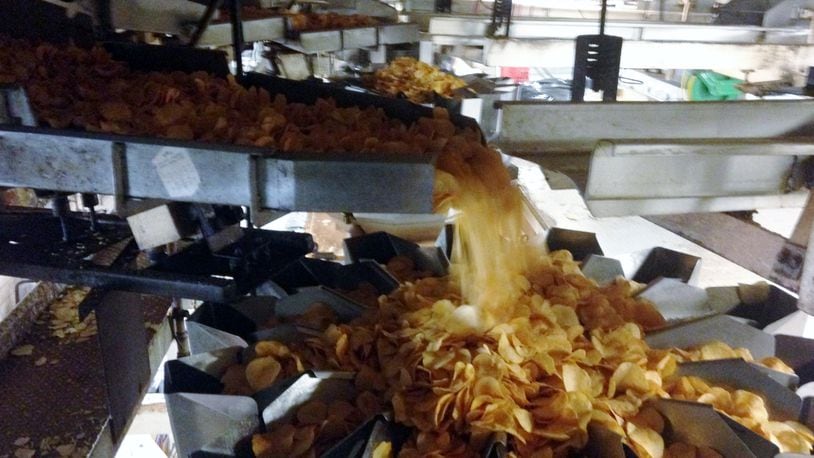Luke Mapp, Mikesell's director of sales and marketing services, said his family's chips have a lot in common with craft beer.
"People like small labels," said Mapp, the great-grandson of company founder Daniel W. Mikesell. "Craft beer offers something new and something small — something unique. That's what companies like ours can offer."
The company is striving to break into markets in Asia and South America, but does most of its business in Ohio, Indianapolis, Kentucky and central Illinois.
Its biggest and most rabid fan base is right here in Dayton, where the company started in 1910 on the back of a bike. But despite that legacy, Mapp said there are some people who don't realize Mikesell's is a local company.
Mapp said it is a Dayton institution for a reason.
"This is our home. We've been here for so long. We just feel like we are part of the community. We are integrated," he said. "We want to continue to call Dayton our home. We want to continue to grow. For us it is more than just about surviving, it is thriving."
The company recently launched its "How Delicious Memories are Made" campaign, asking fans to share stories about their memories with Mikesells snacks for a chance to win prizes throughout the summer.
⇒ ⇒ ⇒ 7 foods that scream DAYTON ⇐ ⇐ ⇐
From potato to chip
After being trucked from farms in one of seven states between Michigan and Florida to the factory, the potatoes are washed with well water and machine peeled — 400 pounds in three minutes.
They are given the once-over by one of the company's 203 employees, who will chop off any gnarly bits and chuck the bad potatoes.
Further down the line, a system that employs a high speed camera and air burst is used to reject brown chips. Filled boxes are sent to an X-ray machine after human inspection.
Mapp said that the starch produced is sold to paper companies for paper coating. Potato hash, another byproduct of the process, is given to local farms as pig feed.
Credit: Amelia Robinson
Credit: Amelia Robinson
It is a simple but impressive production.
Four pounds of potatoes are used to make one pound of potato chips during the process, which takes about 10 minutes from potato to potato chip.
A small percentage of the company employees work in the warehouse and potato chip factory on Leo Street.
There is a distribution center on nearby Stanley Avenue, and other centers are located in Cincinnati, Columbus, Greenville, Sabina and Louisville.
The chips come from Leo Street, but Mikesell's Indianapolis plant produces its Cheese Curls and Puffcorn.
Much of what happens at the Leo Street plant these days, from slicing to cooking to seasoning to bagging, is automated — part of a setup that would surely make Daniel W. Mikesell proud.
It is hard to imagine how everything was done by hand in Mikesell's day.
Beefy Beginnings
Credit: Amelia Robinson
Credit: Amelia Robinson
Then in his 20s, Mikesell delivered home cooked chips on a bike repaired by at the Wright Brothers' shop at 1127 W. Third Street. It was not always easy for Mikesell and his wife Martha.
They rebuilt after their young business was destroyed in the Great Flood of 1913 and by fire in 1915.
The company eventually graduated from bike to horse and buggy, and then to automobile.
It was the first company in Dayton to own Model T Ford panel delivery trucks, Mapp said.
The words "both phones" were printed on the side of the truck to indicate the company had two telephone lines.
Mapp, the son of company director of charitable contributions Martha Mapp — a current board member and a major shareholder — said that was a big deal.
Many didn't have a single phone at the time, he said.
The company changed its name to "Mike-Sell's" — a play on the founder's last name — in 1925 and continued its growth.
A chip off of Mikesell's block
Mapp says his great-grandfather was driven and persistent. He sees those same traits in the family business -- reasons for its longevity.
"He just kept going and going," he said. "We are down to a handful of regional chip brands. All the rest of them have been bought up or consolidated. It's the quality of our products and I think it was the strength of our brand and obviously good business (practices)."
He said they use quality ingredients and premium oils.
About 25,000 cases of chips, pretzels, popcorn, Puffcorn and Cheese Curls pass through the business' warehouse a week. It typically takes 24 hours to get fresh bags to store shelves.
The company uses a unique metal skids system to move boxes around the warehouse and to and from trucks.
Its cardboard packing boxes are reused up to 12 times before being recycled.
He sees a bright future for his company and his city.
"I've seen Dayton make huge strides in the last 10 or 15 (years)," Mapp said. "Dayton has really persevered through. I think they have had some good leaders. I see Dayton turning the corner."
Credit: Amelia Robinson
Credit: Amelia Robinson
Contact this blogger at amelia.robinson@coxinc.com or Twitter.com/DDNSmartMouth
About the Author
